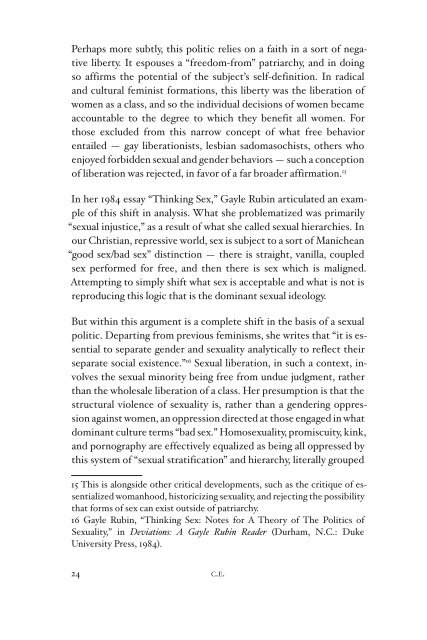Lies: A Journal of Materialist Feminism - Libcom
Lies: A Journal of Materialist Feminism - Libcom
Lies: A Journal of Materialist Feminism - Libcom
You also want an ePaper? Increase the reach of your titles
YUMPU automatically turns print PDFs into web optimized ePapers that Google loves.
Perhaps more subtly, this politic relies on a faith in a sort <strong>of</strong> negative<br />
liberty. It espouses a “freedom-from” patriarchy, and in doing<br />
so affirms the potential <strong>of</strong> the subject’s self-definition. In radical<br />
and cultural feminist formations, this liberty was the liberation <strong>of</strong><br />
women as a class, and so the individual decisions <strong>of</strong> women became<br />
accountable to the degree to which they benefit all women. For<br />
those excluded from this narrow concept <strong>of</strong> what free behavior<br />
entailed — gay liberationists, lesbian sadomasochists, others who<br />
enjoyed forbidden sexual and gender behaviors — such a conception<br />
<strong>of</strong> liberation was rejected, in favor <strong>of</strong> a far broader affirmation. 15<br />
In her 1984 essay “Thinking Sex,” Gayle Rubin articulated an example<br />
<strong>of</strong> this shift in analysis. What she problematized was primarily<br />
“sexual injustice,” as a result <strong>of</strong> what she called sexual hierarchies. In<br />
our Christian, repressive world, sex is subject to a sort <strong>of</strong> Manichean<br />
“good sex/bad sex” distinction — there is straight, vanilla, coupled<br />
sex performed for free, and then there is sex which is maligned.<br />
Attempting to simply shift what sex is acceptable and what is not is<br />
reproducing this logic that is the dominant sexual ideology.<br />
But within this argument is a complete shift in the basis <strong>of</strong> a sexual<br />
politic. Departing from previous feminisms, she writes that “it is essential<br />
to separate gender and sexuality analytically to reflect their<br />
separate social existence.” 16 Sexual liberation, in such a context, involves<br />
the sexual minority being free from undue judgment, rather<br />
than the wholesale liberation <strong>of</strong> a class. Her presumption is that the<br />
structural violence <strong>of</strong> sexuality is, rather than a gendering oppression<br />
against women, an oppression directed at those engaged in what<br />
dominant culture terms “bad sex.” Homosexuality, promiscuity, kink,<br />
and pornography are effectively equalized as being all oppressed by<br />
this system <strong>of</strong> “sexual stratification” and hierarchy, literally grouped<br />
15 This is alongside other critical developments, such as the critique <strong>of</strong> essentialized<br />
womanhood, historicizing sexuality, and rejecting the possibility<br />
that forms <strong>of</strong> sex can exist outside <strong>of</strong> patriarchy.<br />
16 Gayle Rubin, “Thinking Sex: Notes for A Theory <strong>of</strong> The Politics <strong>of</strong><br />
Sexuality,” in Deviations: A Gayle Rubin Reader (Durham, N.C.: Duke<br />
University Press, 1984).<br />
24<br />
C.E.

















